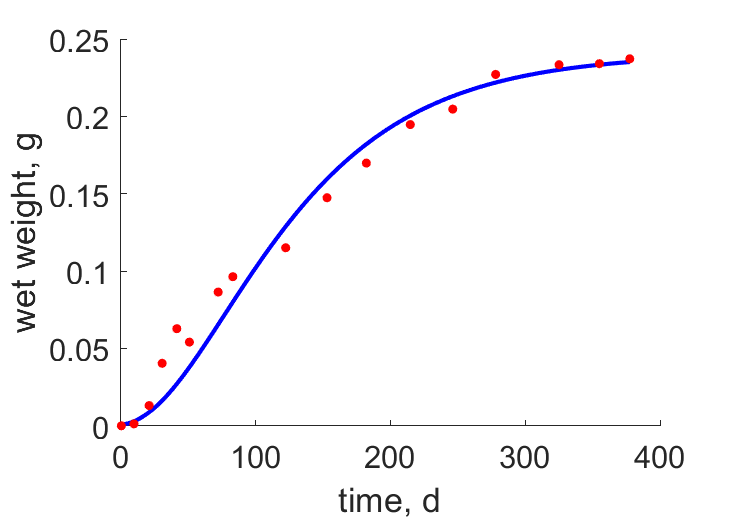Predictions & Data for this entry
| Model: std | climate: C | migrate: | phylum: |
| COMPLETE = 2.5 | ecozone: TP, TN, TA, TH | food: biD | class: |
| MRE = 0.106 | habitat: 0iTh, 0iTf, 0iTi | gender: Hh | order: |
| SMSE = 0.026 | embryo: Tt | reprod: O | family: |
Zero-variate data
| Data | Observed | Predicted | (RE) | Unit | Description | Reference |
|---|---|---|---|---|---|---|
| ab | 17 | 10.13 | (0.4039) | d | age at birth | DucrPery2007 |
| tp | 60 | 76.52 | (0.2753) | d | time since birth at puberty | DucrPery2007 |
| am | 1100 | 1100 | (1.037e-05) | d | life span | DucrPery2007 |
| Wwb | 0.00044 | 0.0005292 | (0.2028) | g | wet weight at birth | DucrPery2007 |
| Wwp | 0.084 | 0.07125 | (0.1518) | g | wet weight at puberty | DucrPery2007 |
| Wwi | 0.24 | 0.2407 | (0.002818) | g | ultimate wet weight | DucrPery2007 |
| Ri | 0.2933 | 0.2934 | (9.371e-05) | #/d | maximum reprod rate | DucrPery2007 |
Uni- and bivariate data
| Data | Figure | Independent variable | Dependent variable | (RE) | Reference |
|---|---|---|---|---|---|
| tWw |  | time | wet weight | (0.08666) | DucrPery2007 |
Pseudo-data at Tref = 20°C
| Data | Generalised animal | Branchiura sowerbyi | Unit | Description |
|---|---|---|---|---|
| v | 0.02 | 0.008633 | cm/d | energy conductance |
| kap | 0.8 | 0.9594 | - | allocation fraction to soma |
| kap_R | 0.95 | 0.475 | - | reproduction efficiency |
| p_M | 18 | 2241 | J/d.cm^3 | vol-spec som maint |
| k_J | 0.002 | 0.002 | 1/d | maturity maint rate coefficient |
| kap_G | 0.8 | 0.8007 | - | growth efficiency |
Discussion
- We assume kap_R 0.95/2 for consistency with how all hermaphrodites are treated in the collection
Facts
- Branchiura_sowerbyi is hermaphroditic. However, two worms are still required for reproduction. (Ref: Wiki)
Bibliography